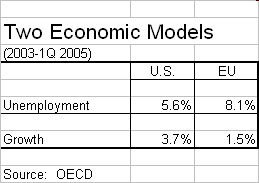Poor Europe. Not long ago, people like Jeremy Rifkin were touting it as the Next Big Thing. Now the Euro is falling, and everyone is pointing out problems. . .The WSJ offers this speaks-for-itself table:1
At any rate, it's hard to dispute this point [quoting today's excellent WSJ editorial]: "European nations penalize work and subsidize non-work, and, no surprise, they have gotten a lot of the latter and far too little of the former. By contrast, the U.S. model--allegedly cruel and "laissez-faire"--has done much better both by economic growth and worker opportunity."

Wealth and Job Creation: U.S. vs Europe (EU 15)
Again, I favor integration of a strong Europe--so long as the electorate, not the elites, of each country select the appropriate economic and regulatory model.
More:
Jonah Goldberg:
In recent years the entire EU project — at least in Western Europe — has taken on an anti-American flavor. Gerhard Schroeder and Jacques Chirac — the lame duck and electorally doomed leaders of Germany and France, respectively — have kept their political engines running on the fumes of anti-Americanism in recent years. The EU project has been sold as a means of counterbalancing the American “hyperpower,” as the French call it. . ._____________
The EU Constitution didn’t fail because of widespread pro-American sentiment. It failed because French and Dutch voters saw their national — and personal — interests at odds with the constitution. The last thing we should do is distract European voters’ attention away from the economy, immigration, and the like by making them angry at us. Gloating would only invite precisely the sort of anti-American pique Chirac and Schroeder have exploited since before the Iraq war. . .
The French have absurdly lavish social-welfare policies, particularly for the middle class and for workers. Opening France to more economic competition threatens their cushy perks. (I knew a French businessman who wanted to fire a lousy truck driver who kept missing work. He had to make an appointment with government bureaucrats six weeks in advance in order to get permission to fire his own employee.)
This points to one of the great ironies of globalization: It imposes a regression to the global mean.
1 Although I'm unable to find the specific OECD source, these OECD data are nearly identical.
No comments:
Post a Comment